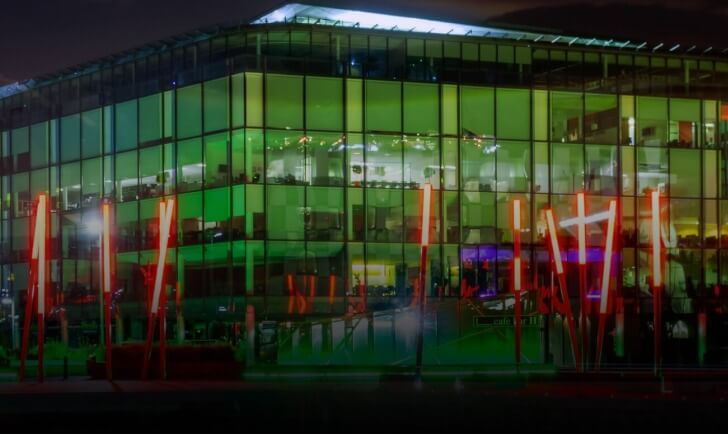The Reuters news staff had no role in the production of this content. It was created by Reuters Plus, the brand marketing studio of Reuters.
Paid for and posted by



Irland: A global center for life sciences
Companies from around the world are investing millions of dollars in setting up and maintaining their life sciences operations in Ireland. From a deep pool of talent to consistent support from the government, the Irish life sciences sector is booming.
On a sunny day in mid-September 2022, New York-headquartered MeiraGTx opened a commercial-scale gene therapy manufacturing facility in Shannon, Ireland. Geographically, the plant is on the western fringe of Europe; sectorally, it is at the cutting edge of the life sciences industry. It will play an important role in the company’s efforts to develop and deliver treatments for a wide range of disorders, from inherited vision loss to neurological diseases such as Parkinson’s and potentially diabetes, obesity and some cancers.
The facility is the first of its kind to open in Ireland, but it fits in seamlessly with the extensive network of other world-class institutions and life sciences and biopharmaceutical manufacturing operations around the country.
“We’ve seen huge amounts of investment in biologics over the past 10–15 years. About €12 billion of investments have been announced in biologics drug substance and drug product facilities,” says Rory Mullen, head of biopharma at IDA Ireland, the country’s inward investment agency.

MeiraGTx, Shannon facility front view

Choose language:
EN
Takeda Grange Castle Dublin API facility 1

A global gathering
In January 2022, Eli Lilly and Company announced plans to invest more than €400 million in a new manufacturing facility for biologic active ingredients on a greenfield site in Limerick, not far from MeiraGTx’s site in Shannon. By 2023, Eli Lily increased this investment to nearly $1 billion.
On the other side of the country, at a site just outside Dublin, the Irish capital, Takeda Ireland, a subsidiary of Japan’s Takeda Pharmaceutical Company, opened a commercial-scale cell therapy production facility in May. A key part of a €36.4 million investment commitment by Takeda announced in 2021, the facility will supply cell therapy treatments to patients in Europe and North America.
Takeda’s global manufacturing and supply officer, Thomas Wozniewski, says its new state-of-the-art facility “underlines the importance of Ireland to the global Takeda manufacturing network. Cell therapy facilities require a specialized set of skills, and the talent base in Ireland is as important as other frame conditions like proximity to partners and an international airport.”
Such investments have made Ireland the world’s third-largest pharmaceuticals exporter, with more than €75 billion worth of exports a year. World-class regulation is an important element of that. Ireland has an exemplary compliance record with agencies like the US Food and Drug Administration (FDA) and the European Medicines Agency (EMA), both of which work closely with Ireland’s Health Products Regulatory Authority (HPRA). There are now 50 FDA-approved plants across the country.
13 of the top 15 biopharma companies by market share cap have operations in Ireland, and the sector employs 45,000 people across the country—up to 10,000 of whom have been employed in the past decade alone. Astellas Pharma, Pfizer and Sanofi are among the many industry names with significant operations in the country. Ireland is also home to 14 of the world’s 15 biggest medical technology (medtech) companies (see box).
The foundation of Ireland’s life sciences industry has been the small-molecule sector, which is still growing and developing. In 2021, AstraZeneca announced a $360 million investment in a new active pharmaceutical ingredient (API) manufacturing facility for small molecules in Dublin. But industry insiders say the strongest growth is now being seen in areas like advanced therapeutics, such as mRNA, cell and gene technologies.
Advanced therapeutics development has been aided by consistent support from the Irish government and the National Institute for Biologic Research and Training (NIBRT), which was set up in 2011 and continues to develop and expand.
The institute, based on the campus of University College Dublin, was established to provide cutting-edge training and has state-of the-art, pilot-scale manufacturing facilities; in 2020, it trained more than 4,000 people. In September 2022, construction began on a new advanced therapeutics research and training facility for NIBRT, which should be fully operational in the second quarter of 2023.
On 8th December 2023, NIBRT hosted the opening of CONCEPT, NIBRT’s facility dedicated to fostering innovation, collaboration, and cutting-edge early stage biotherapy research.
The strong pool of talent in Ireland, along with other factors such as ready access to the wider European Union market, has meant the country has seen continued expansion of its life sciences sector, despite an industry trend of shifting to lower-cost locations.
“We thought the migration of API manufacturing to lower-cost locations in Asia would see a decline in operations in Ireland, but it has actually grown over the past 10 years,” says Mullen. “Companies realize they need to keep some manufacturing expertise in-house. They also look for geographic balance in their supply chain. As a result, Ireland is now the go-to place for US and Asian companies looking to access the European market.”
Geographic considerations are also prompting growth in another area of the industry: Pharmaceutical companies are increasingly setting up services operations to help manage the complex web of commercial, marketing, medical support and regulatory issues they face across Europe. Eli Lilly, for example, has developed a large services operation in Cork, while Switzerland’s Novartis has placed one of its global services centers in Ireland.

Dublin city lights at night
Talent on tap

Grange Castle, Pfizer facility aerial view
A portal To Europe
This ties in well with another strength of the Irish economy: its ability to attract multinational technology companies, many of which use Ireland as their main base for the European Union.
Increasingly, technology and life sciences companies operating in Ireland are identifying opportunities for convergence and cooperation. “Managing complexity and customers across Europe has been a large part of what the international technology companies in Ireland do,” points out Mullen.
One notable aspect of Ireland’s pharmaceuticals and medtech industries is that multinational companies often invest in multiple sites around the country. That is true of AstraZeneca, whose rare disease division, Alexion, announced in June a €65 million investment in a new drug substance production equipment and warehousing facilities in Dublin and Athlone, and in a manufacturing sciences and technology lab in Dublin that will enable an expansion of the company’s biologics drug substance manufacturing capabilities.
Alexion CEO Marc Dunoyer has described Ireland as “an increasingly critical global hub for AstraZeneca operations.” As the substantial investments made in Ireland’s life sciences sector over the past decade show, this is increasingly true for many other life sciences companies, as well.
Ireland’s thriving medtech sector
Over 350 medtech companies operate in Ireland, employing some 50,000 people. Medtech exports from Ireland are worth more than €14.5 billion a year. The sector is strongly backed by the government, and while manufacturing is well-established, there is now an increasing amount of research and development. “Three-quarters of the medtech companies in Ireland are now carrying out some R&D here. Not only are they producing products, but they’re also developing next-generation products,” says Rachel Shelly, Divisional Manager, Life Sciences & Food and Talent, Transformation and Innovation, IDA Ireland.
Ireland is your gateway to collaboration. IDA Ireland can help you forge the path. Find out more here.
Disclaimer: The Reuters news staff had no role in the production of this content. It was created by Reuters Plus, the brand marketing studio of Reuters. To work with Reuters Plus, contact us here.
Advertise With Us Advertising Guidelines
Cookies Terms of Use Privacy Corrections Site Feedback Conact Us
© 2020 Reuters. All rights reserved
JP
EN
EN
A portal to Europe
Read next

Tapping Irish talent to drive tech companies

Why Ireland is the next global finance hub

Webinar Summary
Coming soon...



Read Next
How Ireland Is Becoming a leader in Renewable Energy Technology

Tapping Irish Talent to Drive Tech Companies

Why Ireland is the next global finance hub



